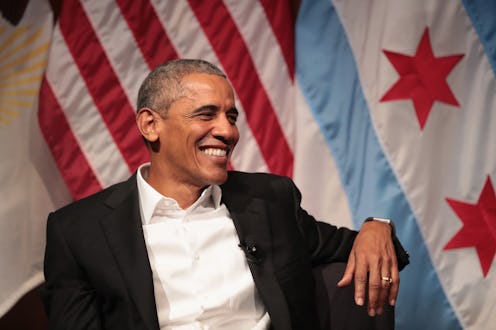News
Obama's Big Wall Street Speaking Fee Won't Help Democrats

During the Democratic presidential primaries in 2016, Hillary Clinton's top-dollar Wall Street speaking fees became a flashpoint issue. In a hard-fought race between Clinton and Bernie Sanders ― one that struck a sharp contrast on some high-priority progressive issues ― her proximity to the same financial firms that Sanders routinely condemned ripped the Democratic Party wide open. And now, a recently departed Democratic icon might end up doing the same thing. Barack Obama's $400,000 Wall Street speaking fee is already stoking the same tensions between the party's centrist and left wings.
For some Democrats ― more likely those who supported Clinton, and are broadly comfortable with the party's status quo over the last several years ― the news that former President Obama is going to cash in with a fat Wall Street check probably won't move the needle all that much. In fact, some ardent Obama supporters on social media have already been pushing against the idea that this is anything to be bothered by.
Why, after all, shouldn't he be able to make some money if people want to hear him talk? And what gives anyone the right to speculate about whether or not he actually needs it? The fact that the Obamas reportedly just signed a $65 million book deal almost entirely undercuts that argument, but if the fundamental position is that he's a private citizen who gets to do whatever he wants, that's fair enough.
But for the progressive grassroots, this kind of thing is anathema, an overt sign of a toxic coziness that exists between liberal politicos and the titans of the American financial industry. And the fact that Obama may now be taking this route ― just eight years after bursting into the presidency as the fresh-faced image of hope and change ― might only reinforce the idea that Democrats catering to elite institutions is inevitable when you settle for half measures. In other words, when you pick relative centrists and incrementalists like Obama and Clinton, rather than seemingly principles-first fire-breathers like Sanders.
And as last November made painfully clear, many scorned progressives who're sick of this kind of thing were indeed sick enough to wave a man like Donald Trump, worse for the left on almost every issue, into the White House. If the party's establishment thought those progressives were bluffing, well, they weren't. And whether you agree with their decision or not, it's clearly a reality the party needs to seriously grapple with.
For the record, Obama's reported $400,000 fee is a whopping sum even in the context of the Clintons' notoriously pricey Wall Street chats ― Bill and Hillary averaged about $210,795 per such speech. Of course, Obama is a much hotter get these days than either of them, with Bill's presidency distant in the rear-view mirror and Hillary never having made it to the top job.
This is no small matter, because the Democratic coalition is simultaneously more activated and energetic and more skeptical of different parts of itself than at any time in recent political memory. While the election of Trump has invigorated progressive activism, it's left a gaping opening for the party's middle and left to continue to war with itself, relitigating the 2016 primary over and over again for months or even years.
And as its most prominent and popular face, Obama is surely aware of the tinder box his party has become. Like it or not, he remains a supremely important figure in the party, and this move is not helpful if he wants or hopes to leverage that status in a positive way.
As such, with perhaps the biggest book deal ever already signed, and countless other opportunities to make money that don't involve speeches to Wall Street firms, it would seem like a good time for Obama to pump the brakes and reconsider. But that might not happen, and it'll be left to Democrats and progressives to decide what they make of the situation.